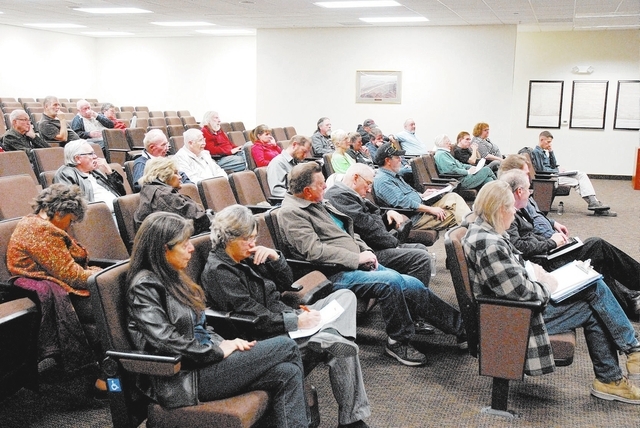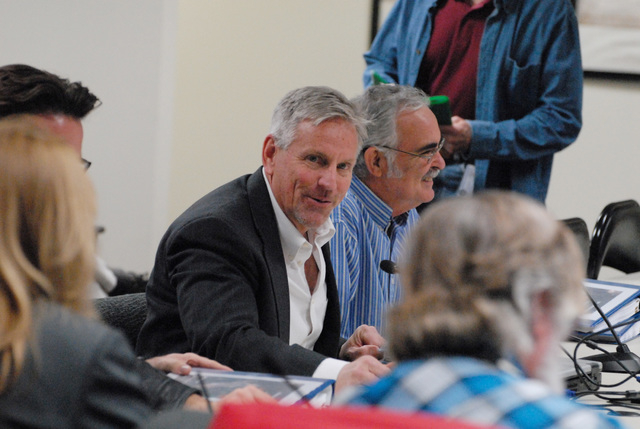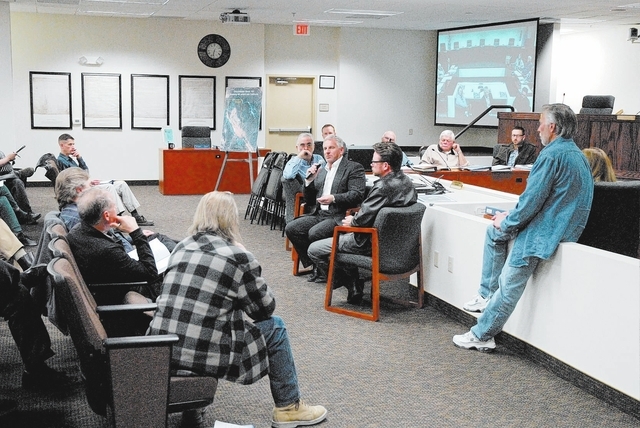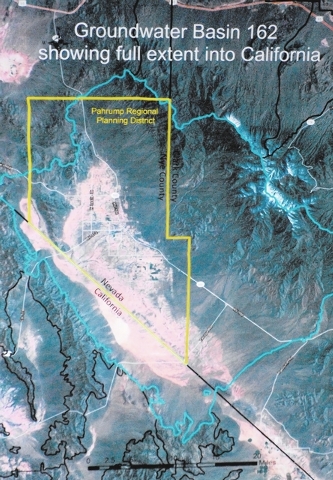State engineer seeks to ease water fears
State engineer Jason King sought to reassure a crowd Wednesday night at the inaugural meeting of a Pahrump groundwater management committee it may be some years before impacts from a water management plan affect the public.
“This is a good faith effort to start doing the multiple things that’s needed to bring the basin into balance so 50 years from now you don’t have a potential to pump 60,000 acre feet, you have the potential to pump 30,000 acre feet,” King said. “I hope people understand that. It’s not as heavy-handed.”
But local developers in the audience anxiously waited to see if the state engineer would suggest measures to limit future growth in an attempt to reduce the draw down of the Pahrump water level. The state engineer’s office estimates the recharge of precipitation into the Pahrump basin is 12,000 acre feet annually. In 2012, groundwater withdrawals were estimated at 14,136 acre feet.
There are 62,000 acre feet of permitted water rights in Pahrump Valley, not counting 11,000 wells, an imbalance that could lead the valley’s water basin to be designated a critical management area. In a worse case scenario, the state engineer could honor water rights based on seniority. Well owners could also be forced to stop using any pumped water outside of their homes.
The newly-formed, seven-member Basin 162 Groundwater Management Plan Advisory Committee is tasked with drawing up a plan to deal with the water basin’s imbalance. Assembly Bill 419, passed by the 2009 Nevada Legislature, mandates from the time a groundwater basin is designated a critical management area there’s 10 years for a critical management plan to be prepared.
“We are building a plane and flying it at the same time. We have never put together a groundwater management plan like we will do in Pahrump,” King said. “I am excited to get this process underway and actually bring Pahrump and Diamond Valley and a handful of other basins in the state on the road to get into balance. It took years to get into this condition and it’s going to take years, even decades, to get to a point where we feel comfortable managing water in the basin.”
He said the committee could draw up a groundwater management plan to avoid being designated a critical management area and said it’s critical to get a buy-in from as many stakeholders as possible.
“But I want to be very clear up front,” King said, “if we can’t make any movement on a groundwater management plan, I want you all to understand that our office is committed to moving onward on an area of critical management.”
“If we ever get to a point where we have to regulate this basin by priority, everyone other than the most senior water right holders can be curtailed,” he said.
The Division of Water Resources already issued 12,000 acre feet of water rights to match the perennial yield in Pahrump Basin by 1943. About 99 percent of the wells in Pahrump Valley were drilled after that point, King said.
“They have a priority date post perennial yield and if we have to regulate based on priority, most of those domestic wells will be curtailed,” he said. “We will curtail the use of domestic water for indoor use only and not outdoor use and we will also probably require metering on those wells.”
Board members, like Greg Dann, questioned how many of those 62,000 acre feet of water rights were being used to the fullest extent.
“The answer is absolutely not,” King said. “There is a big disparity regarding what is on paper and what is being pumped.”
He cautioned the committee about writing off people’s water rights. “I want to be very clear and many of you know this: water rights are real property and they’re owned by people and to simply wipe them off the books of water law certainly would be a taking.”
Water rights holders can keep them as long as they put them to beneficial use within five years. King said some water rights holders, when they know his department is coming out to do an inventory, will turn on the water and activate the totalizer meter. He admitted the Nevada law on beneficial use often results in wasting water — a dichotomy not easily remedied.
Committee member Walt Kuver asked how the state engineer and state statutes account for 50,000 acre feet of water rights that don’t actually have water to back them up. King said when people are awarded water rights they accept it on the basis of senior water rights appropriation, the “first in time, first in right” doctrine.
“My concern obviously circles back to the domestic well. If AB 419 is enacted in this valley, they’re dead,” Kuver said.
King repeatedly said he’s sensitive to domestic well owners but the only tools he has to deal with is Nevada water law.
“Our biggest hammer we don’t want to use is regulation by priority. You’re not going to get any argument from me, there’s going to be a lot of capital spent, homes built and wells drilled, but we have a limited resource,” he said. “If everyone wants to live in Pahrump, they’re going to have to co-exist and work to stretch this limited resource.”
Utilities Inc. of Central Nevada Regional Director Wendy Barnett, one of three water utility representatives on the committee, wanted to shift the focus of the discussion from water supply to demand and promoting good stewardship of water.
A number of audience members offered comments during the inaugural hearing. Many of them expressed political viewpoints.
“Do you have the authority to stop development here in this valley? Because the only way we’re going to stop this water problem is to stop building. The water here will only accommodate so many people,” audience member Herman Payne said. “This is supposed to be a country of less government and it sounds like we’re getting more government.”
King said he can’t regulate building, only water rights and advocated smart development. “We have the authority to prevent any more wells drilled in the basin,” he said.
King said he didn’t want to cut off resident Roxanne Dann’s 25 acre feet of water or cap her well. But he warned, “in a scorched earth scenario, yes your water rights are endangered.”
Audience member and resident Mike Reimler told King, “who gave out water rights? Is that your department? They had to assume water was never ending here. Why would you give out too many water rights? You’ve caused the problem.”
When Wade Hindon complained people moved to Pahrump to get away from government intrusion, King said, “You and I are going to be dealing with these issues for some time and it’s not always going to be amicable.”
Residents need to ask themselves if they’re doing something to exacerbate the water problem, he said.
“I think it’s OK if we have some discussion and it gets a little heated because that’s going to be part of this discussion for a while,” King said.

















